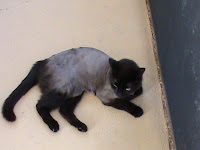What's The Skinny on Feline Hyperthyroidism?
Hyperthyroidism is a fairly common disease in older cats. It occurs when a (usually) benign tumor forms on one or both thyroid glands in the neck region. These tumors cause the gland to produce much more thyroid hormone than is necessary. The bad news about hyperthyroidism is that it can be very dangerous - spikes in blood pressure and heart problems caused by too much hormone can be fatal. The good news is, hyperthyroidism is treatable! And if it is treated properly, it doesn't shorten your cat's life.
Symptoms of hyperthyroidism can include: weight loss, ravenous appetite (although I have seen many cats lose their appetite due to nausea), nausea, vomiting, diarrhea, fever, excessive vocalization (howling), restlessness, behavior changes, blindness (associated with high blood pressure and retinal detachment), and poor coat quality. Sometimes the increase in appetite can be amazing - I've had patients get caught jumping INTO AN OVEN to steal food or stealing things like vegetables from babies sitting on the floor! These poor cats are typically hungry all the time and lose significant amounts of weight.
Hyperthyroidism (or HT4) can be diagnosed with simple blood tests. A total thyroid hormone (T4) test is the screening test used. If the thyroid hormone is in the normal range but above a certain level, another test called a Free T4 is recommended to confirm hyperthyroidism. I have a sibling pair of 13 year old cats that I diagnosed with HT4 within the same year. My boy, Sinner, had a T4 level of 8.3 (normal is up to 4.0 at our lab). His sister, Saint, had a T4 level of 2.7 (above 2.5 is a concern in older cats), so I ran a Free T4. Sure enough, it was elevated. Both are receiving treatment and doing well.
There is an exciting new treatment for HT4. Hills recently released Prescription Diet y/d. This is a diet that is low in iodine. The thyroid gland requires iodine to produce thyroid hormone. Hills has had spectacular results with cats who eat this diet exclusively. Unfortunately, my two mischievous monkeys found ways to steal their housemates' food, so it wasn't an option for us. http://www.hillsvet.com/pd-feline-yd-dry.pdf
Methimazole is a drug that treats hyperthyroidism. It is required every day to keep thyroid levels normal. Frequent bloodwork is needed to make sure the drug isn't causing bone marrow problems and is controlling the thyroid. This is the option I chose for my two cats. They each take methimazole twice daily in Pill Pockets Duck flavored treats http://www.greenies.com/en_US/Products/felinepillpockets.aspx. Methimazole can also be made into a liquid, treat, or even a gel that you rub on the cat's ear (for those naughty beastables who don't take oral medication well).
If it is available in your area, radiation therapy is an excellent option for HT4. I131 therapy is offered at many specialty practices. Your kitty will need to stay in the hospital for a few days after the treatment. This is curative for HT4 in the majority of cases.
Surgery is another option for HT4. The affected thyroid gland is removed. However, it is important to note that if only one gland is removed, the other often begins producing too much thyroid hormone within a year. Another risk is that the parathyroid gland (responsible for calcium regulation) sits on top of the thyroid glands. The surgeon must be careful not to damage or accidentally remove these glands. If both thyroid glands are removed, then your cat will need to be on a supplement for life.
HT4 can be dangerous, but with regular screening it is easy to catch early and treat. It is one of those diseases that makes taking your older cat to the vet once or twice yearly well worth it. In feline practice, we recommend a full bloodwork screening yearly and a mid-year examination with weight check. If your kitty's weight has dropped unexpectedly, bloodwork for thyroid problems is recommended. Cats 7 years of age and older are at risk for HT4. And your kitty doesn't have to be skinny to have a problem.....even fat cats can lose dramatic amounts of weight and still appear hefty. If your cat is 7 or older and hasn't been to the vet in awhile, please take them in and have them screened. You could ensure a longer, happier life for them!
Photos: Sinner and Saint sporting their summer cuts!
Posted by:
Dr. Cherie Buisson (Click here for Dr. B's full bio)
drb@lapoflove.com
Dr. Buisson services all towns in and around Pinellas County including St. Petersburg, Pinellas Park, Seminole, Largo, Clearwater, Dunedin, Palm Harbor, and the beaches.
Dr. Buisson services all towns in and around Pinellas County including St. Petersburg, Pinellas Park, Seminole, Largo, Clearwater, Dunedin, Palm Harbor, and the beaches.
Please explore our website www.lapoflove.com or contact your local Lap of Love veterinarian to ask any questions you may have about hospice and euthanasia.
Click the states below for a list of veterinarians near you:
North Carolina
Florida
Tennessee
Click the states below for a list of veterinarians near you:
North Carolina
Florida
Tennessee





No comments:
Post a Comment
Note: Only a member of this blog may post a comment.